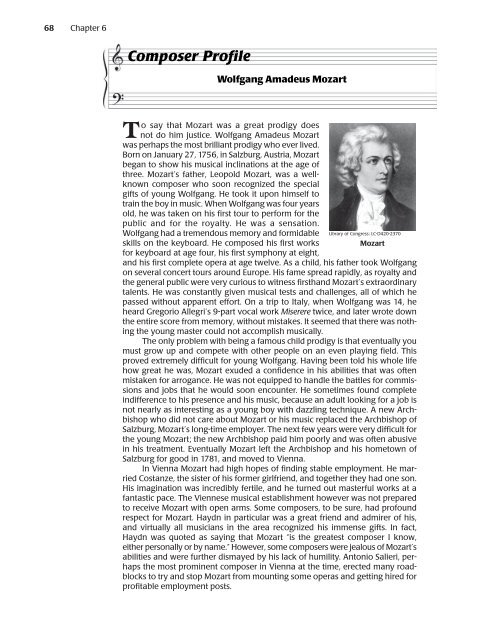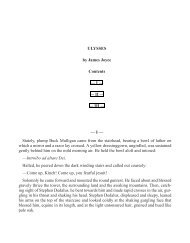Composer Profile - Activefolio
Composer Profile - Activefolio
Composer Profile - Activefolio
You also want an ePaper? Increase the reach of your titles
YUMPU automatically turns print PDFs into web optimized ePapers that Google loves.
68 Chapter 6<br />
<strong>Composer</strong> <strong>Profile</strong><br />
Wolfgang Amadeus Mozart<br />
To say that Mozart was a great prodigy does<br />
not do him justice. Wolfgang Amadeus Mozart<br />
was perhaps the most brilliant prodigy who ever lived.<br />
Born on January 27, 1756, in Salzburg, Austria, Mozart<br />
began to show his musical inclinations at the age of<br />
three. Mozart’s father, Leopold Mozart, was a wellknown<br />
composer who soon recognized the special<br />
gifts of young Wolfgang. He took it upon himself to<br />
train the boy in music. When Wolfgang was four years<br />
old, he was taken on his first tour to perform for the<br />
public and for the royalty. He was a sensation.<br />
Wolfgang had a tremendous memory and formidable<br />
skills on the keyboard. He composed his first works<br />
for keyboard at age four, his first symphony at eight,<br />
Mozart<br />
portrait<br />
Library of Congress: LC-D420-2370<br />
Mozart<br />
and his first complete opera at age twelve. As a child, his father took Wolfgang<br />
on several concert tours around Europe. His fame spread rapidly, as royalty and<br />
the general public were very curious to witness firsthand Mozart’s extraordinary<br />
talents. He was constantly given musical tests and challenges, all of which he<br />
passed without apparent effort. On a trip to Italy, when Wolfgang was 14, he<br />
heard Gregorio Allegri’s 9-part vocal work Miserere twice, and later wrote down<br />
the entire score from memory, without mistakes. It seemed that there was nothing<br />
the young master could not accomplish musically.<br />
The only problem with being a famous child prodigy is that eventually you<br />
must grow up and compete with other people on an even playing field. This<br />
proved extremely difficult for young Wolfgang. Having been told his whole life<br />
how great he was, Mozart exuded a confidence in his abilities that was often<br />
mistaken for arrogance. He was not equipped to handle the battles for commissions<br />
and jobs that he would soon encounter. He sometimes found complete<br />
indifference to his presence and his music, because an adult looking for a job is<br />
not nearly as interesting as a young boy with dazzling technique. A new Archbishop<br />
who did not care about Mozart or his music replaced the Archbishop of<br />
Salzburg, Mozart’s long-time employer. The next few years were very difficult for<br />
the young Mozart; the new Archbishop paid him poorly and was often abusive<br />
in his treatment. Eventually Mozart left the Archbishop and his hometown of<br />
Salzburg for good in 1781, and moved to Vienna.<br />
In Vienna Mozart had high hopes of finding stable employment. He married<br />
Costanze, the sister of his former girlfriend, and together they had one son.<br />
His imagination was incredibly fertile, and he turned out masterful works at a<br />
fantastic pace. The Viennese musical establishment however was not prepared<br />
to receive Mozart with open arms. Some composers, to be sure, had profound<br />
respect for Mozart. Haydn in particular was a great friend and admirer of his,<br />
and virtually all musicians in the area recognized his immense gifts. In fact,<br />
Haydn was quoted as saying that Mozart “is the greatest composer I know,<br />
either personally or by name.” However, some composers were jealous of Mozart’s<br />
abilities and were further dismayed by his lack of humility. Antonio Salieri, perhaps<br />
the most prominent composer in Vienna at the time, erected many roadblocks<br />
to try and stop Mozart from mounting some operas and getting hired for<br />
profitable employment posts.



